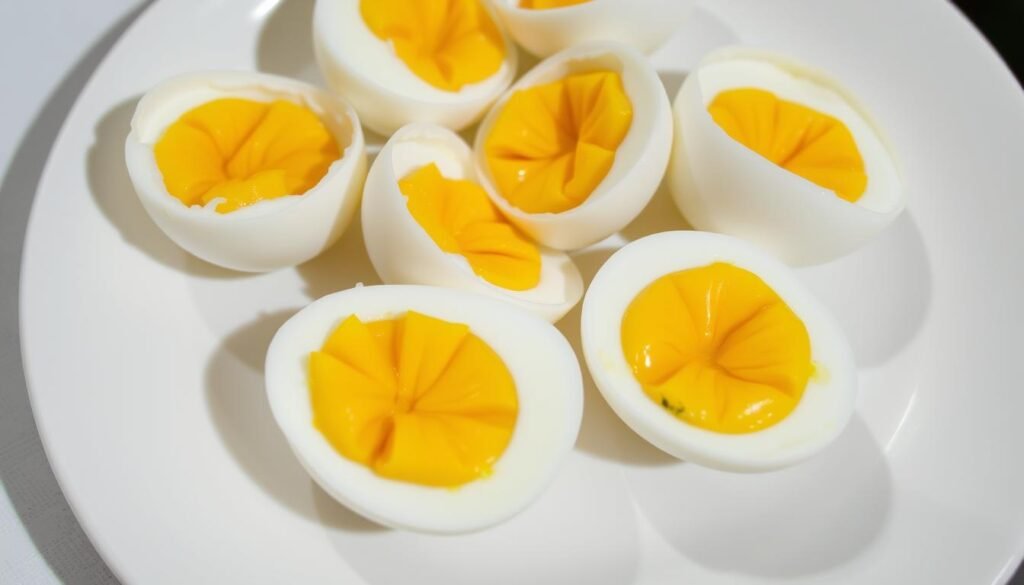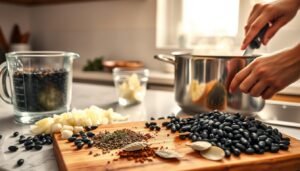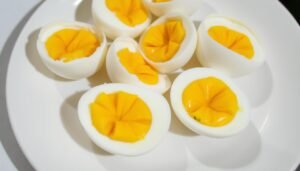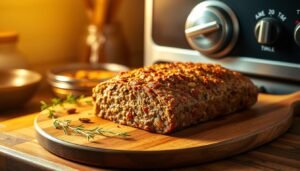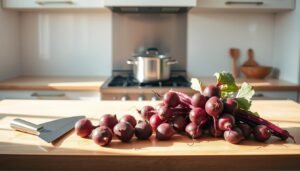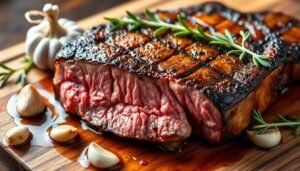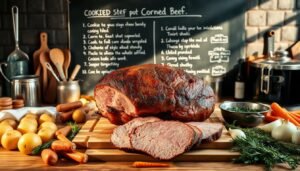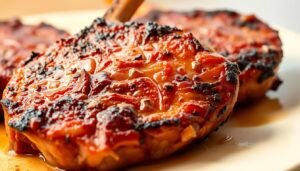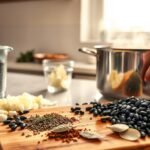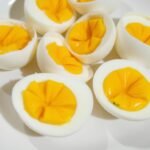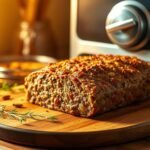Did you know over 150 million eggs are eaten every day in the U.S.? Eggs are a big deal, not just for breakfast. They’re also in salads, sandwiches, and deviled egg platters. To get hard boiled eggs just right, you need to know the perfect cooking time.
In this article, I’ll show you how to get that creamy yolk and tender white. These are the qualities that make hard boiled eggs so popular for snacking and recipes.
Key Takeaways
- Hard boiled eggs require careful attention to cooking time for optimal results.
- Understanding egg anatomy helps in achieving desired textures.
- Cool eggs properly to make peeling easier.
- Freshness of eggs can impact cooking times and final results.
- There are various methods for boiling eggs, including starting with cold or boiling water.
Understanding Hard Boiled Eggs: What You Need to Know
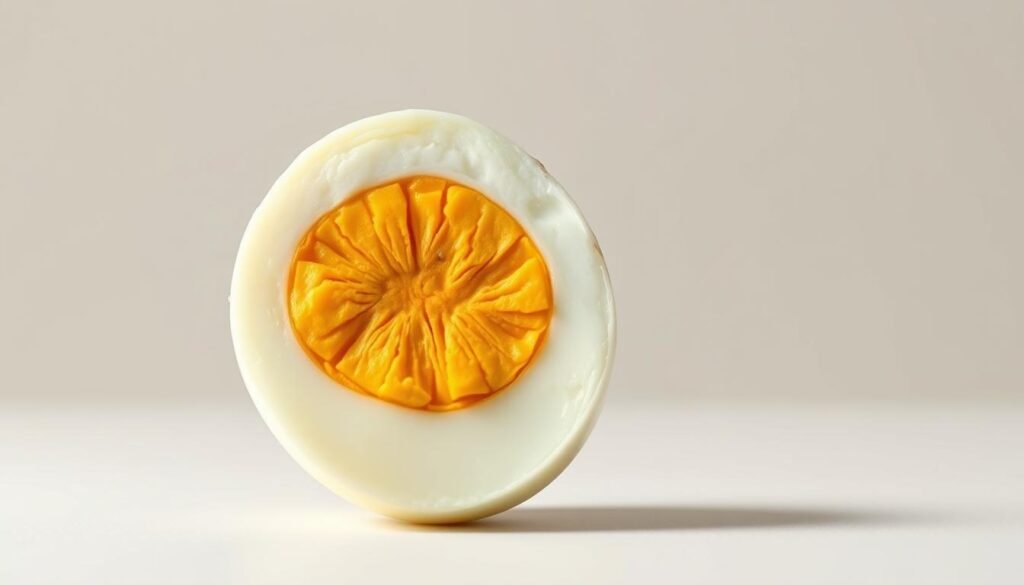
Learning about an egg’s anatomy is key to making perfect hard boiled eggs. An egg has a shell, egg white, and yolk. Each part is important for the egg’s quality. The shell lets air in, keeping the egg fresh. The egg white adds protein and moisture, while the yolk has fats, vitamins, and minerals.
Understanding these parts helps us see how they work together when boiling eggs. This affects the egg’s texture and taste.
The Anatomy of an Egg
An egg’s structure is crucial for cooking. The shell protects it, and the egg white helps with texture. The yolk adds richness and nutrition.
Knowing how an egg is made helps us avoid overcooking. Overcooking can make the egg white rubbery and the yolk green. This is because of too much heat.
Why Cooking Time Matters
Cooking time is key for hard boiled eggs. If you cook them too long, they become rubbery and may have a green ring. This is not what most people want.
By getting the timing right, we can make eggs that are just right. The yolk stays buttery, and the white is tender. Getting the timing right is the secret to making great hard boiled eggs.
| Part of the Egg | Function | Cooking Impact |
|---|---|---|
| Shell | Protects the egg | Porous; allows air exchange for freshness |
| Egg White | Provides protein and moisture | Dense; affects texture, specially when overcooked |
| Yolk | Contains fats, vitamins, and minerals | Richness influences flavor and outcome if cooked too long |
The Perfect Cooking Time for Hard Boiled Eggs
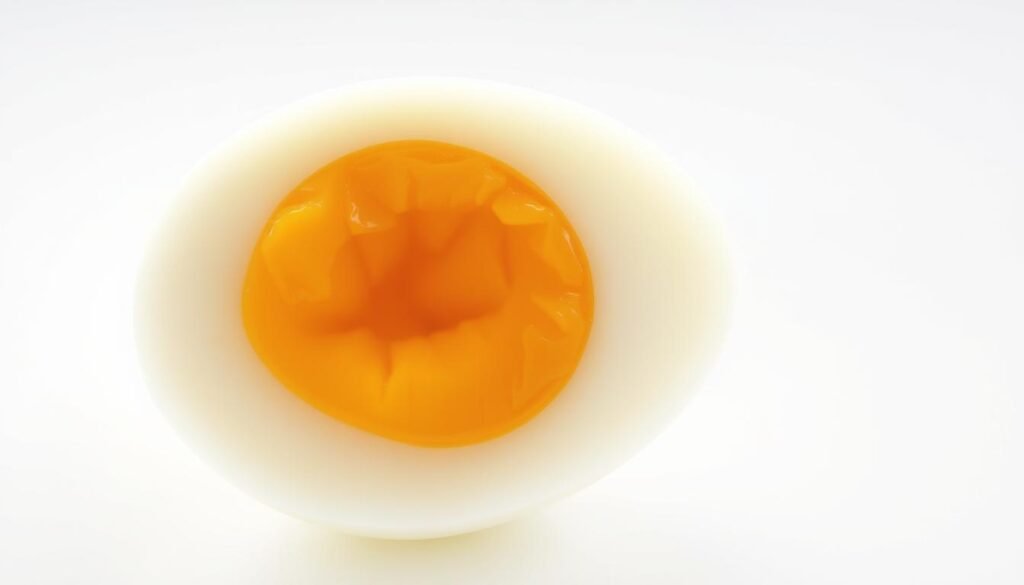
Learning about cooking times for soft-boiled and hard-boiled eggs makes cooking better. These two ways of cooking eggs give different textures and tastes. This affects the dish I make.
Soft-Boiled vs. Hard-Boiled: What’s the Difference?
Soft-boiled eggs have a runny yolk and soft white. They’re boiled for 6 to 8 minutes. This makes them great with toast or salads.
Hard-boiled eggs, boiled for 9 to 12 minutes, have fully set whites and yolks. They’re perfect for salads, sandwiches, and snacks.
Time Guidelines for Different Preferences
Choosing the right cooking time depends on personal taste. Here are some guidelines:
- 6 minutes: For a runny yolk – perfect for a cozy breakfast.
- 8 minutes: For a soft-boiled egg that still has a creamy texture.
- 10 minutes: For classic hard-boiled consistency – great for deviled eggs or lunch boxes.
- 12 minutes: For fully cooked eggs – ideal when I need a firm yolk for specific recipes.
This helps me get consistent results. It also meets the different tastes in my household or when I have guests.
Preparing Eggs for Cooking
Choosing the right eggs is key when boiling them. The right eggs make peeling easier and improve the texture. I find that eggs that are a week old work best. They peel better because the inner membrane sticks less to the shell.
Choosing the Right Eggs
Think about the egg size too. Bigger eggs cook more evenly and peel better. I always choose “large” eggs for boiling.
How to Prepare Eggs for Boiling
To start, place eggs in a single layer in a pot. Cover them with cold water, making sure the water level is an inch above the eggs. This helps cook them evenly.
It’s best to use boiling water directly. This method prevents eggs from cracking and ensures even cooking.
I use a slotted spoon to lower eggs into hot water. This method reduces breakage and ensures consistent cooking, whether I’m boiling one or many eggs.
The Boiling Method: Step-by-Step Guide
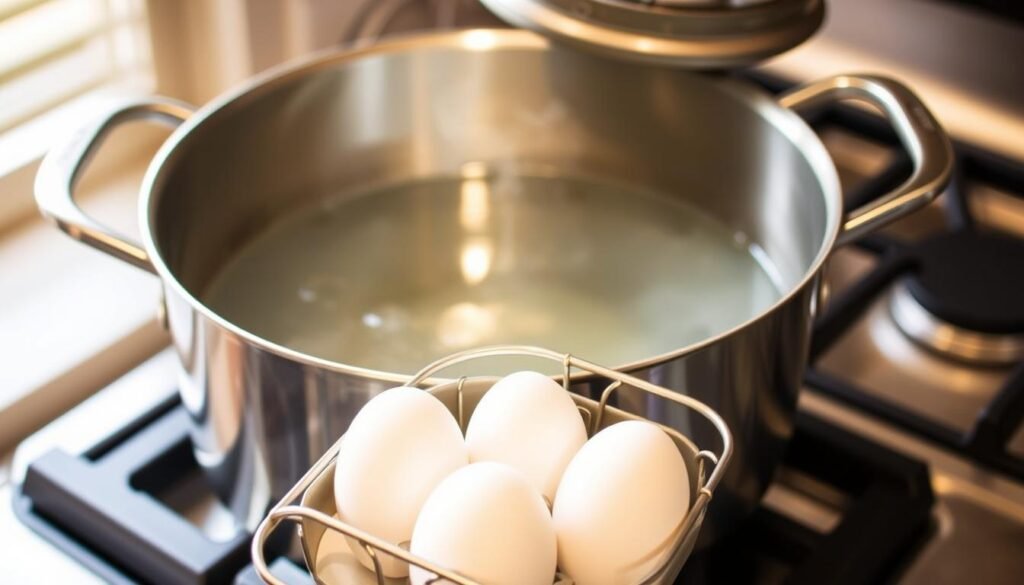
Choosing the right method for hard-boiled eggs is key. I often debate between starting with boiling water or cold water. Each method affects the egg’s texture and how easy it is to peel.
Boiling Water First vs. Starting in Cold Water
Boiling water first helps me control the cooking better. Cold water can lead to unpredictable results due to different pots and stoves. Starting with boiling water ensures my eggs cook evenly, giving me perfect results every time.
Adjusting Cooking Time for Elevation and Freshness
Altitude affects my boiling method too. At higher elevations, water boils at a lower temperature. So, I add extra time to the cooking. Freshness also matters—older eggs might need less time. By considering these factors, I get perfectly boiled eggs every time.
| Method | Cooking Time | Notes |
|---|---|---|
| Boiling Water First | 9-12 minutes | Consistent texture, easier to peel |
| Starting in Cold Water | 10-15 minutes | Inconsistent texture, potential for cracked shells |
| High Altitude Adjustment | Add 3-5 minutes | Lower boiling point, requires longer cooking |
| Fresh Eggs (1-2 weeks old) | 8-10 minutes | Optimal cooking time for freshness |
| Older Eggs (3+ weeks old) | 7-9 minutes | Typically peel easier |
Cooling and Peeling Hard Boiled Eggs
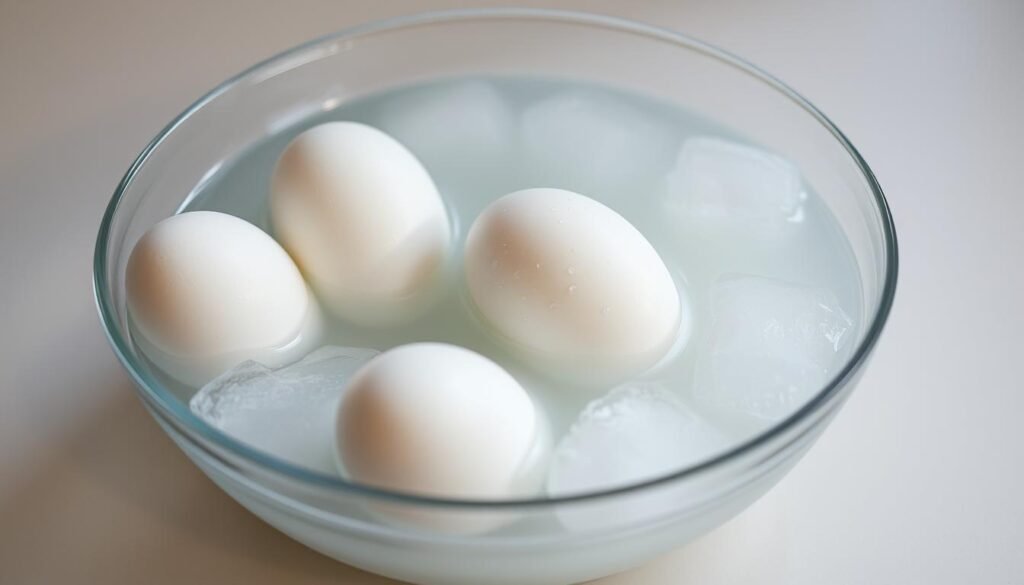
After taking the eggs off the heat, cooling them properly is key. It ensures the best texture and flavor. It’s important to stop cooking right away to avoid overcooking. This keeps the yolks creamy and vibrant.
One effective way to cool eggs is by putting them in an ice bath for about 14 minutes. This makes peeling them later much easier.
Key Steps for Cooling Eggs Properly
To cool eggs well, I follow these steps:
- Prepare a bowl filled with ice water before boiling the eggs.
- Once the eggs are cooked, remove them from the heat and put them in the ice bath.
- Let the eggs sit in the ice bath for about 14 minutes, ensuring they cool evenly.
Cooling eggs this way prevents overcooking. It also makes peeling easier since the membrane separates from the shell more effectively.
Best Techniques for Peeling Hard Boiled Eggs
Peeling hard-boiled eggs can be tricky if you don’t do it right. Here are my top peeling methods for easy-to-peel eggs:
- Tap the cooked egg gently on a hard surface to create cracks.
- Begin peeling the shell under running water. This helps wash away any stubborn bits of shell stuck to the egg whites.
- Start peeling at the wider end of the egg, where there’s often an air pocket. This makes it simpler to start peeling.
Using these peeling methods increases the chance of perfectly peeled eggs. This makes them look great for presentation and eating.
Common Mistakes When Cooking Hard Boiled Eggs
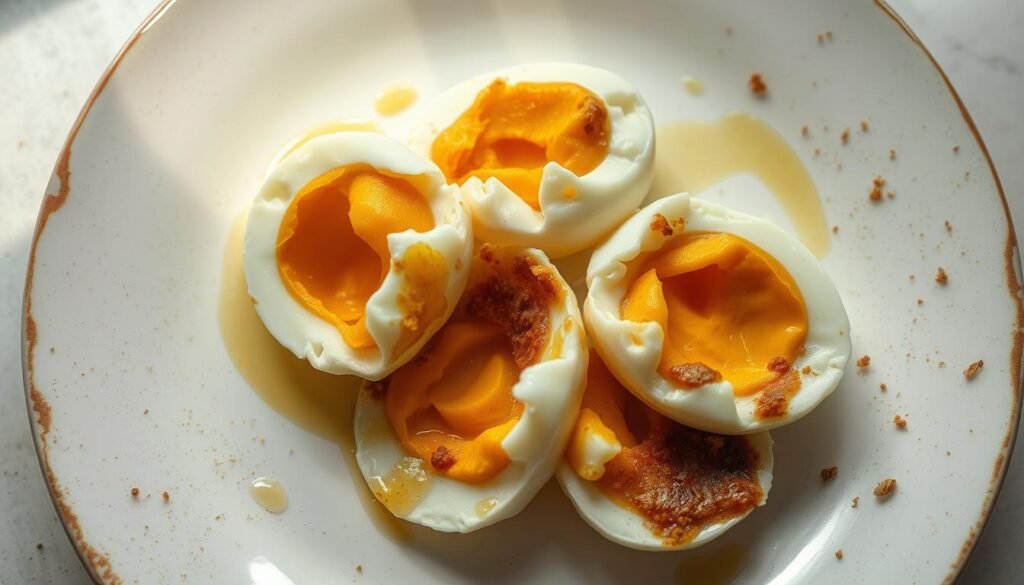
Cooking hard-boiled eggs might seem easy, but there are common mistakes. Knowing when eggs are overcooked is key to getting them right. Overcooked eggs can be dry and chalky, and may even have a greenish ring around the yolk.
This greenish ring comes from a reaction between sulfur and iron. Spotting these signs helps you cook eggs perfectly every time.
Overcooking: Signs and Consequences
When I see signs of overcooking, I adjust my cooking time for next time. These mistakes can make eggs dry and disappointing. They often happen because of not watching the cooking time closely enough.
By keeping an eye on the time, eggs stay soft and creamy. A guide can help you get the timing right for your liking.
Underestimating the Cooling Process
Another mistake is not cooling eggs properly after boiling. Not cooling them enough can cause them to keep cooking from the heat left inside. This often results in overcooked eggs.
Putting eggs in an ice bath quickly stops the cooking. This helps keep the eggs soft and makes them easier to peel. It makes every egg-cooking experience better.
Storing Hard Boiled Eggs
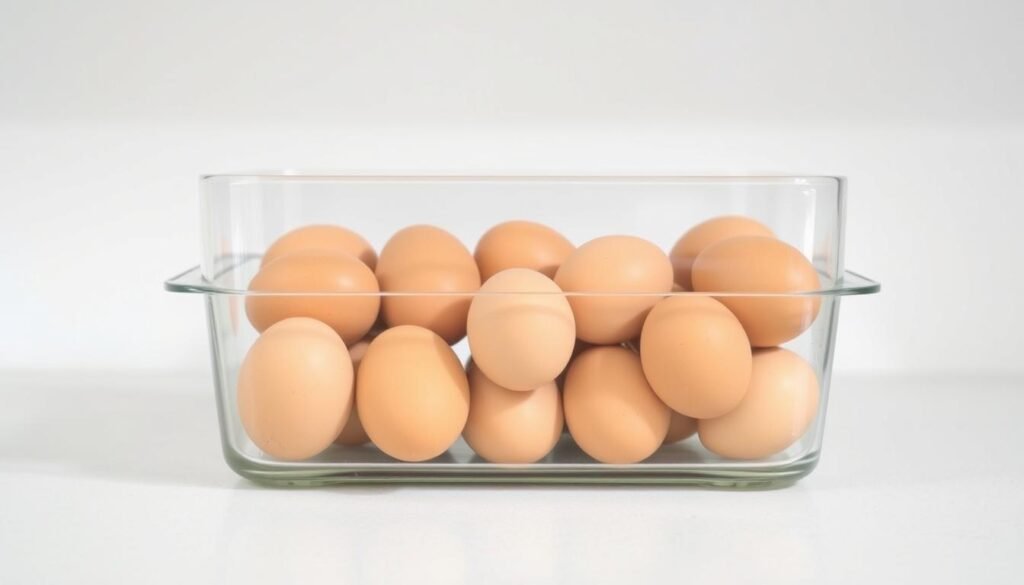
Storing hard boiled eggs right is key for keeping them fresh and safe. I’ll share top tips for keeping eggs fresh longer. Also, I’ll show you how to spot when eggs have gone bad.
How to Store for Maximum Freshness
Unpeeled hard boiled eggs last longer. Store them in a covered container in the fridge for up to five days. If peeled, eat them within two days. Use a sealed container for peeled eggs to keep them fresh.
Signs of Spoilage to Watch For
It’s important to know when eggs have spoiled. Look out for:
- Off odors: A bad smell means the egg is not good to eat anymore.
- Unusual discoloration: Unexpected colors on the egg’s surface or inside can be a sign of trouble.
- Changes in texture: If the egg feels slimy, it’s time to throw it away.
By watching for these signs, you can make sure hard boiled eggs are safe and tasty.
Variations on the Classic Hard-Boiled Egg
Hard-boiled eggs are more than just a snack. They can become exciting dishes with a bit of creativity. By trying different seasonings and ways of preparing, I’ve found many spiced egg variations. These add a burst of flavor to our daily meals.You can learn more about how to cook corned beef.
Simple spices like paprika, curry powder, and garlic powder can make hard-boiled eggs taste better. They make eating them more fun.
Spiced and Seasoned Variations
Flavored hard-boiled eggs offer endless possibilities. I mix spices to create unique flavors that I love. Here are some ideas to spark your creativity:
- Smoky Paprika: A sprinkle of smoked paprika adds a warm taste.
- Curry Bliss: Curry powder brings a delightful twist.
- Garlic Delight: Garlic powder adds a savory depth.
These spiced egg variations can make a simple dish into a gourmet treat. Each spice is an invitation to explore new tastes. You can find many of my favorite combinations in creative egg recipes that use hard-boiled eggs in many ways.
Creative Serving Suggestions
It’s easy to turn hard-boiled eggs into something special. I love using them in different meals for their nutritional value and taste. Here are some ideas for using hard-boiled eggs:
- Salads: Sliced eggs make a lettuce or grain salad better.
- Grain Bowls: Chopped eggs add texture and protein.
- Deviled Eggs: A fun twist on a classic that always gets a thumbs up.
- Toast Toppers: Sliced eggs on avocado toast make a great breakfast.
These ideas show how versatile hard-boiled eggs are. They fit well into many dishes, making meals more interesting. With a little creativity, hard-boiled eggs can be part of many recipes, making our meals both healthy and tasty.how to cook pork chops in oven.
Nutritional Benefits of Hard Boiled Eggs
Hard-boiled eggs are packed with essential nutrients, making them a favorite in many diets. They contain about 6 grams of protein, which is a big help for your daily protein needs. This protein helps keep your muscles strong and can also help you feel full, which is good for managing your weight.
Protein Powerhouses: Health Benefits Explained
Hard-boiled eggs offer more than just protein. They are rich in vitamins like vitamin D, which is good for your bones. They also have vitamin B12, which is important for your nerves and making red blood cells. Plus, they have choline, which is great for your brain health. This makes them a key part of a healthy diet.You can learn more about how to cook butternut squash.
Hard Boiled Eggs in a Balanced Diet
Adding hard-boiled eggs to your diet brings in a mix of nutrients. Their protein and fat help keep your energy steady all day. Many experts say eggs should be a part of your daily meals because of their health benefits. Eating hard-boiled eggs regularly is a tasty way to boost your health.
Fun Facts About Eggs
Eggs have a fascinating journey from farm to table. Understanding their features can make our cooking more exciting. In the U.S., egg sizes and grading are key to quality and use. This knowledge helps me choose the best eggs for my meals.
Egg Sizing and Grading in the U.S.
Eggs come in different sizes like small, medium, large, extra-large, and jumbo. The egg grading process checks shell quality and yolk appearance. This leads to grades like AA, A, and B. Knowing the size and grade ensures I get high-quality eggs for cooking.
The History of Hard Boiled Eggs
The history of eggs is rich and diverse, showing their importance in many cultures. Hard-boiled eggs are special, like during Easter, where they symbolize new life. Their historical significance comes from being versatile and nutritious, loved for centuries. Today, they offer protein and creativity in cooking, opening up many culinary paths.
Conclusion: Mastering the Hard Boiled Egg
Mastering hard boiled eggs is all about knowing the right cooking times and how to cool and peel them. Using older eggs, adjusting water temperature, and even a baking soda bath can help. These tips are essential for anyone looking to improve their cooking skills with eggs.
It’s also important to be creative with eggs. Everyone has their own taste preferences. By trying different cooking times and methods, you can find the perfect egg for you. This makes cooking more fun and leads to better results, turning a simple dish into something special.
If you want more tips on hard boiling eggs, check out this article. Every time I cook, I get better and enjoy the tasty results. Happy cooking!


